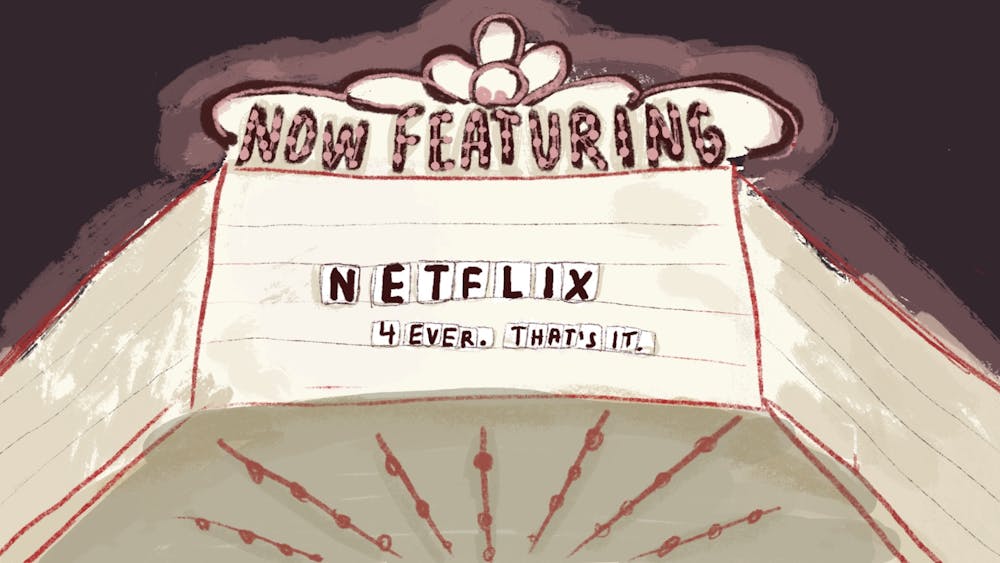Glass Onion: A Knives Out Mystery, The Gray Man, or earlier, Red Notice—these are what Netflix co–chief Ted Sarandos termed as “big event films” and supposedly represent the company’s (I hate to call it a film studio) path forward under a “bigger, better, fewer” refrain after its shocking earnings disclosure last April that resulted in a significant stock value loss. Deliciously packaged and advertised, these “big event films,” however, distressingly stand in every possible way at the opposite of the cinematic art, and I’m not comparing them to esoteric, erudite arthouse productions. Being innovative is an excessively high standard; they’re just not interesting or even entertaining.
Netflix’s big event films possess all the elements of a huge, Hollywood genre hit: big stars, fancy action sequences, a tour around the globe, and even lovely, ill–timed humor. Yet the outcome is not an organic synthesis but a brutal addition of success–guaranteeing labels, a product resembling a meal replacement that contains everything but tastes like nothing. The joke is so intentional that you can see it coming three minutes in advance; the arrangement of sequences so brusque that the meticulous calculation almost leaks through the screen—and not even the big one.
Hollywood, despite its long and sinful history of racial and sexual discrimination, used to know how to make blockbusters that were, simply put, fun. Netflix disagrees, and vehemently believes an AI program that tracks where the audience pauses and fast forwards knows better and could produce the second Titanic or The Lord of the Rings. And streaming services aren’t just hurting blockbusters; after all they’re still at the top of the food chain. On the other end of the spectrum, arthouse cinema can always find its niche market as well. It’s the medium–sized, original productions that take the biggest hit.
While blockbusters still attract the audience back to the theaters with irreplaceable visual effects after the pandemic, medium–sized films without the glamour of franchise or fandom lost all their appeal and have to resort to streaming services for help. Netflix’s solution is a devastating homogenization: each year it produces innumerable romcoms and action thrillers and even documentaries (that sadly look more like news compilations than films), yet you could not recall a single one of them. They’re made under the same tested, approved, and carefully executed formula, but filmmaking isn’t just changing a few variables (the cast, the twist, the color palette…) and moving around the equations.
Worth noting is that, in an era where huge Hollywood studios are increasingly risk–averse and reject basically every proposal without stars or huge IP, Netflix has supported many auteurs like Martin Scorsese and Alfonso Cuarón and produced admirable films otherwise unimaginable. Yet the argument does not shield streaming services from the criticism—in fact, it adds to it. Netflix’s intention of funding independent productions is far from a genuine love of artistic freedom. It’s that such arthouse films, just like the tons of Jason–Bourne–copycats or Nancy–Meyers–wannabes or whatever you’d like to call the trio of Dwayne Johnson, Ryan Reynolds, and Gal Gadot, also serve a specific market of audience (in this case, condescending cinephiles) and represent a specific strand of demand awaiting satisfaction.
There’s a deeply concerning capitalist logic behind streaming services like Netflix. What they’re “creating” is an empire of needs, carefully catering to the interest and desire of each infinitesimally subdivided group of filmgoers and then subsequently subsuming them under the subscription plan that in itself already represents a social stratification—do you wish to watch three more pieces of meaningless advertisement or trade your money with time? The result is the ultimate commodification of the creative enterprise where every film becomes a product and every director, writer, actor, and actress, a disposable worker on a conveyor belt contributing to a hegemonic giant machine.
I do not wish to sound like an annoying fundamentalist who claims that only films screened in a theater are qualified and can be deemed as “cinema.” The idea is retroactive and elitist, totally disregardful of the rapid advancement in both film industry and academia. But I also believe that a surrender to streaming services, along with its worship of technology, homogenization, and capitalism, isn’t necessarily the best way forward.
When I came to US for the first time for a summer high school program, the greatest cultural shock I experienced was not food or tradition, but the fact that every evening in the lounge of the dorm, someone would always ask, should we Netflix something. In that sentence, “Netflix” is no longer a noun, but both an action verb and a metonymy. Instead of a streaming service, Netflix alone stands for watching films and, a step further, films themselves. The huge universe of cinema is flattened to a website that not only provides food, but invents our desire for them. So maybe next time, instead of relying on the world’s most advanced algorithm to feed you the content, at least think just for one more second what you really want to watch on this wonderful night.







